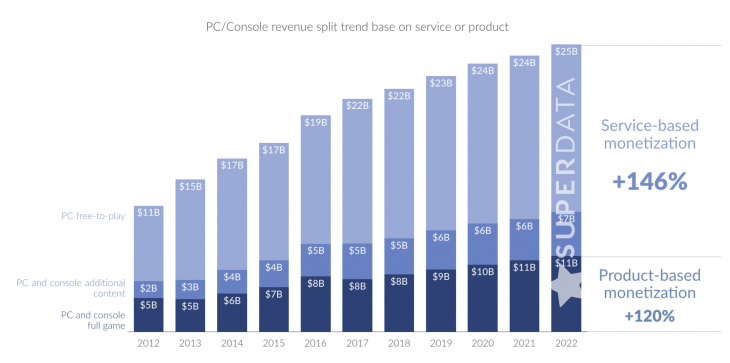Gamers are spending more and more on additional content

According to SuperData the revenue from microtransactions in free-to-play PC titles will reach around $22 billion (£16.4 billion) in 2017. This is a 15.7 percent growth year-on-year, and shows a trend that shows consumers are leaning towards add-on purchases.
The revenue generated from additional content in console and PC games will be similar to last year at $5 billion (£3.7 billion). Revenue from full games on both consoles and PC looks like it will be similar to last year as well at $8 billion (£5.9 billion).
SuperData have also reported that revenue generated by microtransactions in PC free-to-play titles has doubled compared to 2012. In 2012 revenue reached $11 billion and plateaued at around $17 billion in the years following. This year however, SuperData predicts it will reach $22 billion, rising to $25 billion by the year 2022.
Revenue from additional content for PC and console games has increased by 250 percent since 2012, and full game revenue has grown 60 percent over the same period.
SuperData added to their report saying that while gamers profusely complan that publishers are ruining games by monetising them to the point of almost removing any sense of fun, they continue to support service-based monetisation with the purchases they make. According to SuperData add-on content is increasingly earning more money than the traditional model of a one time purchase, a trend that seems to be growing.
This is a result of publishers of PC and console games looking for ways to make more money out of the finite audience available to them. Microtransactions and add-on purchases are a way for publishers to decrease the entry price for a game, but continue to earn money from it, potentially more than they’d make with the traditional one time purchase model. For many platforms this has been incredibly successful, and as a result microtransactions won’t be going anywhere any time soon.
SuperData use the example of FIFA 17 to display how EA is earning more revenue from add-on content and microtransactions than they are from sales of the base game. They say that Battlefront 2 mirrors FIFA 17’s revenue model, but there are subtle changes between the two that have resulted in Battlefront 2 becoming a frenzy of negative media. The difference appears to be in how the in-game content earned from microtransactions affects the game, with customisation options being far more acceptable than upgrades that give players an advantage over others.


